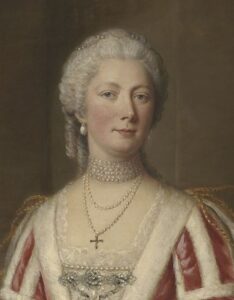PITT (née Grenville), Hester
8 November 1720 – 3 April 1803
Baroness Chatham
Hester was the sixth child and only daughter of Richard Grenville and his wife Hester, daughter of Richard Temple of Stowe. In 1754 she married William Pitt the elder whom she had known for many years because of William’s friendship with her brothers. They moved to Hayes where Hester was largely responsible for supervising the implementation of her husband’s plans for the garden and for the enlargement, decorations and furnishings of Hayes Place.
Between 1755 and 1761 they had five children – Hester, John, Harriot, William and James. When Pitt was away she wrote to him daily about both the activities of the children and events at Hayes Place and in the village. She played a very important part in the life of both her husband and her children although her role has to a large extent been overshadowed by her husband and fourth child William, who both became Prime Ministers. But throughout her life she was a source of strength for them.
A woman of influence
The banker Coutts referred to her as ‘the cleverest man of her time in politics and business’. She was well informed. In August 1760 Lady Hester Pitt wrote to her husband after the news of the victory at Torgau ‘I wait for the guns and then Hayes bells shall speak for the king of Prussia’ and after the successes in Canada Pitt sent a messenger on horseback to Hester who replied ‘Happy and glorious for my beloved England, happy and glorious for my most loved and admired Husband’.
Hayes Place was an important centre of political debate and even cabinet meetings were held there when her husband was unable through ill health to make the journey to London.
On Pitt’s resignation in 1761 Hester was made Baroness Chatham. In 1765 Pitt was left Burton Pynsent in Somerset and he began to plan for its rebuilding leaving Lady Chatham to negotiate the sale of Hayes Place. In early May she expressed her sorrow at leaving Hayes, ‘so loved a place’, but she also stated that she was ’somewhat fatigued by such continual business and such continual company’. Hayes Place was sold in 1766 to Thomas Walpole but then Pitt changed his mind and decided that only the ‘sweet air of Hayes’ could make him better. Considerable guile was needed by Hester to persuade Walpole to resell the property to them, even though it cost them a great deal.
Later years
After their return to Hayes in 1767 Pitt continued to have periods of illness. Indeed these would lead to his virtual retirement in Hayes for the last three years of his life (1775-78). At this time Hester wrote virtually everyday to his physician Dr Addington for advice on the best action to take to cure her husband. On the description of Chatham’s symptoms Addington would prescribe for the patient by letter. Dr Addington certainly visited Hayes but it is not clear how often. The main burden of care fell on Mr Reed the Hayes family practitioner and on Hester herself. Indeed Vere Birdwood refers to her ‘heroic devotion to a deeply depressed and depressing patient’.
It was also a difficult time financially and Hester tried to let either Hayes or Burton Pynsent. More and more money had to be loaned by kind friends and advances were made on an already much mortgaged Hayes. When Pitt died in Hayes in 1778 Parliament granted £20,000 to clear his debts which was a relief for Hester who now decided to sell Hayes and moved to Burton Pynsent. However, the settlement of affairs took some time and she made half yearly visits to Hayes. It was 1784 before the property was sold.
Her last few years were very hard. Her eldest daughter Hester, who had married Charles Mahon son of 2nd Earl Stanhope in Hayes in 1774, never really recovered from the birth of her third child and died in July 1780. Shortly after Hester heard that her youngest son James, who was in the navy, had died in the West Indies. Her son William hurried down to Somerset to comfort his mother and persuaded her to move to Hayes so that she might be more accessible from London. It was on January 23 1781 that he took his seat in the House of Commons and although he became the youngest ever PM he still sought his mother’s advice and support until she died in 1803.
Further information:
Birdwood, Vere ed, So Dearly Loved So Much Admired, HMSO 1994
